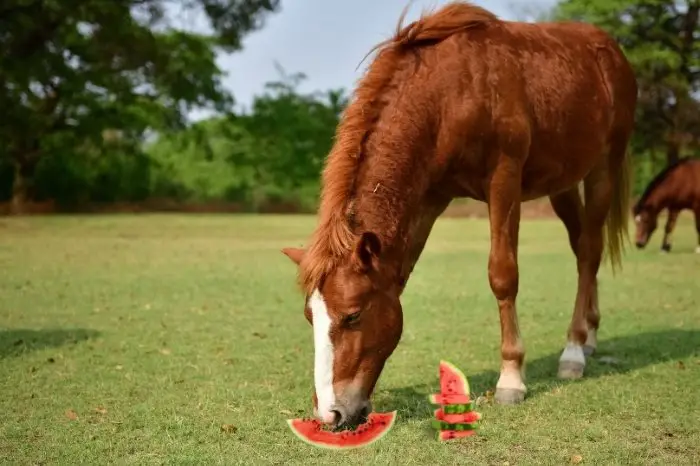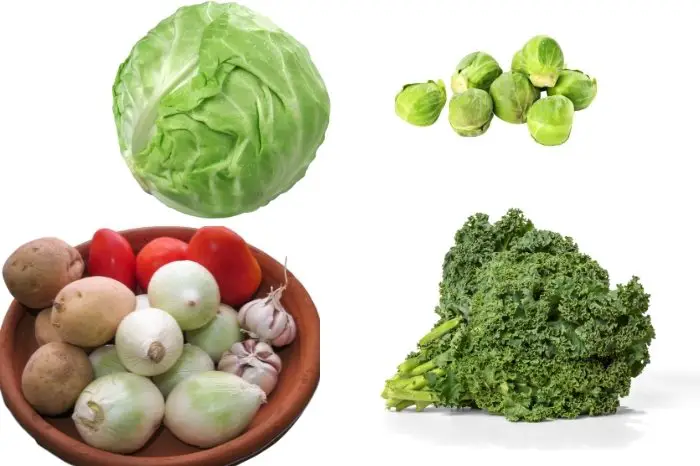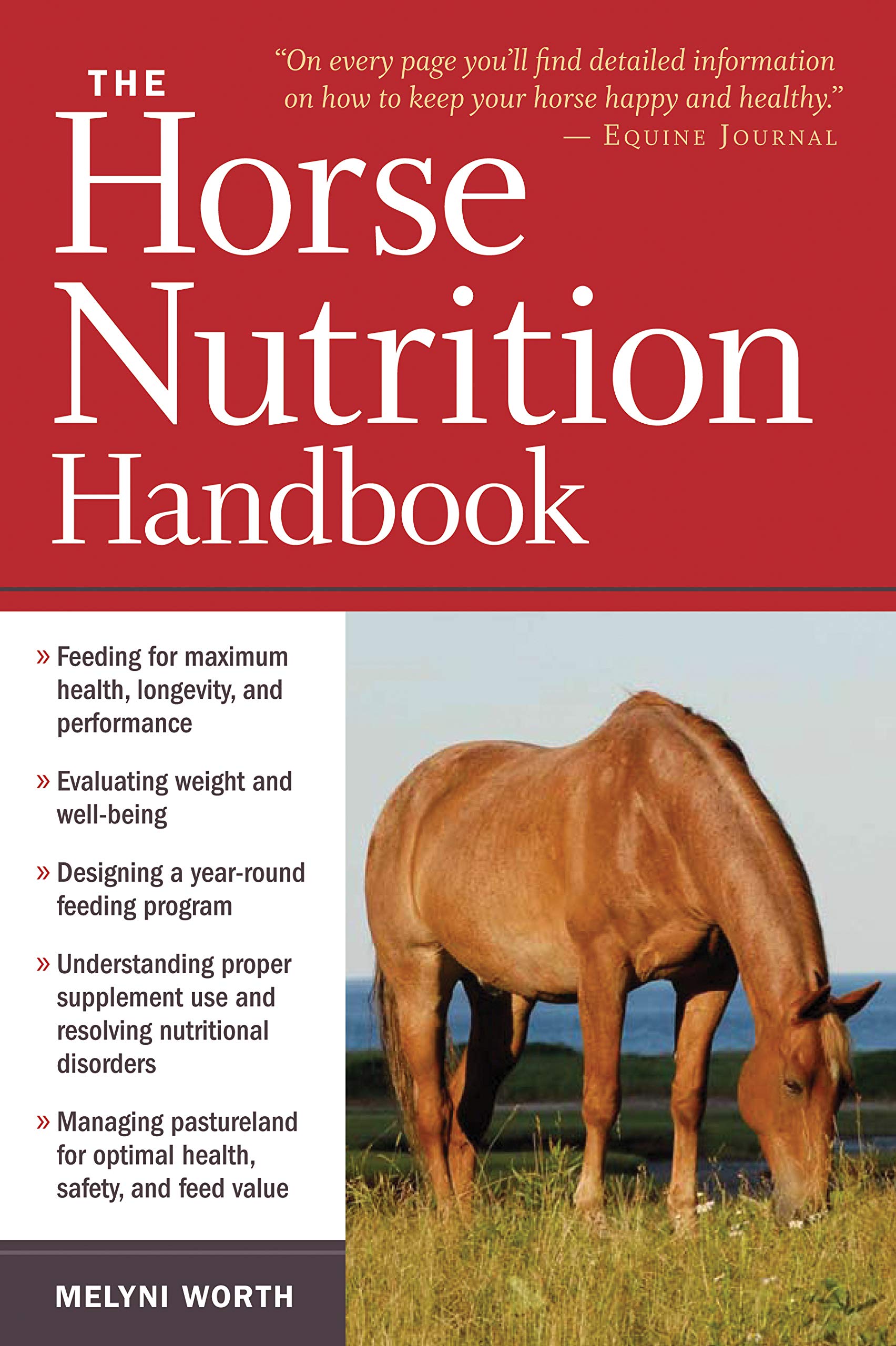Last Updated on March 30, 2022
Who doesn’t love a slice of watermelon – beautiful, sweet, juicy fruit, packed full of healthy vitamins? They really are a taste of summer! But can horses have watermelon? And is it good for them to eat?
In some countries, watermelon is often fed to horses as a treat, and they can enjoy this delicious fruit as a snack. However, watermelon is not part of their natural diet and should not be fed in large quantities. Feeding watermelon may also have some nutritional benefits to horses
Let’s take a look at watermelon fruits and find out how to feed watermelon to horses.
Can Horses Eat Watermelon?
The natural diet for horses is one that contains a high amount of roughage. This means foods which are high in fiber, such as grass or hay. If you are a horse owner or spend time at your local yard, you will be familiar with the huge amounts of hay horses will eat each day!
To add some variety into the horse’s diet, many people like to also feed fruit or vegetables. The classic examples are apples and carrots, and most horses will gobble these up readily. However, many people do not realize that horses can also eat other types of fruit such as watermelon!
Watermelon is high in vitamin A, vitamin C, and potassium. It is also 90% water, so great to take along as a snack on a long, hot trail ride. The rind is also high in fiber, so will add some roughage to your horse’s diet.

Like any addition to the diet, watermelon should be fed as a treat and should not make up the main proportion of the daily food intake. So, buying a sack load of watermelons for your horse is not a good idea, and may result in a considerable digestive upset! If a horse eats a large amount of food he is not accustomed to, he may develop colic or diarrhea. Both of these digestive problems can be very uncomfortable and potentially life-threatening.
Watermelon is also very high in sugar, which can harm your horse if eaten in large quantities. Sugar can cause long-term medical conditions such as laminitis. For this reason, watermelon should not be fed to overweight horses, or those suffering from insulin resistance.
How To Feed Watermelon To Your Horse
Horses can eat all parts of the watermelon fruit – the rind, flesh, and pips. The rind should be cut into small cubes to avoid the risk of choking. The fleshy part can be left whole, just for the fun of seeing your horse biting into it!
The rind of the watermelon should be washed before feeding, to get rid of any toxic chemicals such as pesticides. Stick to feeding a set amount of watermelon, no more than two cups per day, to avoid overfeeding.
Do Horses Eat Watermelon?
Horses vary widely in their appetites – some will eat absolutely anything, while others are much pickier! Young horses are inquisitive and will have a nibble on most things. As horses get older, they will be less adventurous in their tastes.
There is only one way to find out if your horse will eat watermelon, and that is to try it! Cut up some bite-sized chunks of the flesh first and mix with pieces of other favorite fruits such as apple. Feed these by hand and see what your equine friend thinks about this new snack!
If he enjoys the flesh, it is likely that he will eat the rind and pips as well. Cut the rind into small chunks first, as larger pieces may cause choking. It can be great fun to leave the flesh as a whole slice with the rind removed.
One of the best things about horses eating watermelon is that you now have a nice cold snack to give them on a hot day! Store your watermelon in the refrigerator before feeding to keep it chilled. You can even pop it into the freezer for a short while to make a healthy iced snack for your horse!
What Other Fruits Can Horses Eat?
Feeding watermelon may have got you wondering about what other fruity snacks your horse might enjoy. Many of us have just fed apples for years, but you might be surprised at the other fruits which horses can eat! As with watermelon, keep the quantities small to avoid digestive upsets and an excess of sugar.
If your horse is healthy and not suffering from any medical disorders then almost any fruits and vegetables are safe for them to eat. Popular fruit treats include grapes, raisins, bananas, and strawberries. They may also enjoy vegetables such as celery, peas, pumpkin, and squash.
Remember that all of these should be cut into smaller pieces before feeding. Why not chop up a little fruit salad to share with your horse on a sunny picnic ride? Definitely a healthier alternative to sugary peppermints and candies!
What Fruits And Vegetables Are Poisonous To Horses?
Some fruits and vegetables are not suitable for feeding to horses, for various reasons. Brassica vegetables, such as cabbage, kale, and Brussels sprouts, may cause an excess of intestinal gas. Members of the nightshade family – potatoes and tomatoes – may also be toxic to horses.

Alliums, such as onions, shallots, and garlic, can cause a form of hemolytic anemia if fed in large amounts. This is why care should be taken when feeding garlic supplements, and the recommended dose should never be exceeded.
Summary
As you’ve seen, you absolutely can feed watermelon to your horse as a refreshing snack or treat! This sweet juicy fruit is enjoyed by many horses, although not all will like the taste. Watermelon should not be fed in large amounts, as it is not a natural part of the horse’s diet.
Do you have any questions about horses eating watermelon? Add a comment below this post and we’ll get back to you! We’d also love to hear your suggestions on other great treat ideas for your horse!
Why is watermelon good for horses?
Watermelon is a very healthy fruit that is high in water content. A single serving of watermelon has about 90% water and 10% sugar. It also contains vitamins A and C, magnesium and phosphorus. The watermelon rind is a rich source of fibre and the amino acid citrulline, which converts to arginine in the horse’s digestive system. Horses are unable to produce arginine on their own, so the addition of an arginine supplement can help improve blood flow and muscle growth. Watermelon is also high in vitamin A, which helps maintain healthy skin and hair. Vitamin C helps in many ways, such as protecting the body from free radicals that cause diseases. Vitamin C is also known to help strengthen bones and teeth. And magnesium is known to help regulate the nervous system.
Can horses eat the green part of watermelon?
Small quantities of watermelon rind is fine for your horse to eat. Your horse should be also able to eat the ripe part of the watermelon, as well as watermelon seeds. However, as with anything in this world, the key is in the balance so don’t overfeed your horse with watermelon rind. Two cups of watermelon rind per day is more than enough for a healthy horse. If you are feeding your horse too much watermelon rind, it can cause bloating, diarrhea, and abdominal discomfort. If your horse has a history of colic or other stomach problems, better to not feed it any watermelon rind. Watermelon rind contains substances that are a natural laxative that may cause diarrhea in horses if they overdo it.
What fruit can horses not have?
A “stone” or “pit” in a fruit (like whole peaches, avocados, and cherries) could be hazardous to a horse if the horse swallows it. Horses may choke on the pit and the pit may also cause damage or obstruction to the intestines and/or stomach. Some horses may also have allergies to certain fruits. In some cases, these allergies will be evident in the form of colic, diarrhea, or other intestinal upset. If you suspect your horse has an allergy to a particular fruit, consult your vet for advice. It’s also not recommended to feed your horse fruits in excess (any kind of fruits) as this could lead to gas and colic problems.
Can horses eat mango?
Mangoes are sweet, nutritious and an excellent treat for horses. Mangoes contain lots of vitamins, minerals, enzymes, amino acids, antioxidants, fiber, and carbohydrates which makes them a very good feed for your horse. Mangoes are high in vitamin C, vitamin A, vitamin B6 and vitamin E which is a powerful antioxidant and essential for cell growth and healing. Mangoes are also rich in potassium and phosphorus which are needed for strong muscles, bones, teeth and hooves. Mangoes have a great flavor, they are easy to digest, and the fruit itself doesn’t contain any harmful chemicals or toxins.
However, this is not true for the mango skin and leaves of a mango tree as they sometimes have an effect similar to that of poisonous ivy to people. This effect has not been reported in horses, though, but it’s still better to avoid it in order to prevent any possible problems.

Kate Chalmers is a qualified veterinary nurse who has specialized in horse care for the vast majority of her career. She has been around horses since she was a child, starting out riding ponies and helping out at the local stables before going on to college to study Horse Care & Management. She has backed and trained many horses during her lifetime and competed in various equestrian sports at different levels.
After Kate qualified as a veterinary nurse, she provided nursing care to the patients of a large equine veterinary hospital for many years. She then went on to teach horse care and veterinary nursing at one of the top colleges in the country. This has led to an in-depth knowledge of the care needs of horses and their various medical ailments, as well as a life-long passion for educating horse owners on how to provide the best possible care for their four-legged friends.
Kate Chalmers BSc (Hons) CVN, Dip AVN (Equine) Dip HE CVN EVN VN A1 PGCE

